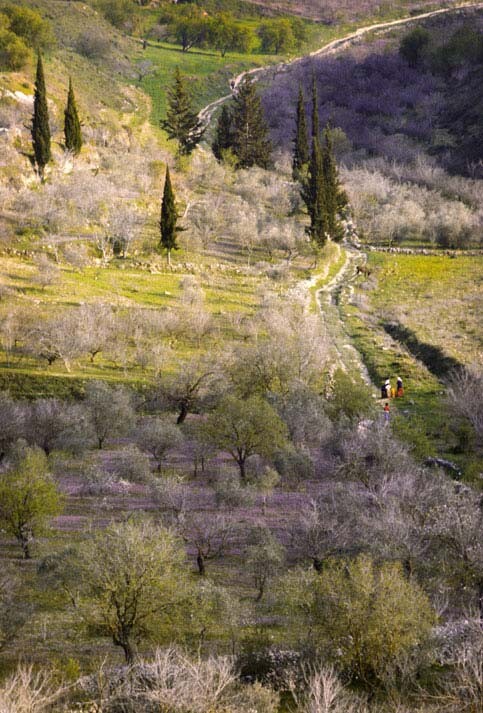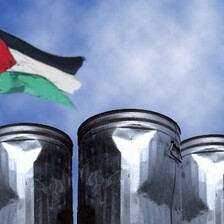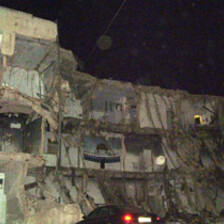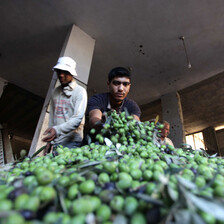Palestine Report 14 October 2004

Orchards at Sebastiya (Photo: Luke Powell)
The olive harvest season is usually a happy occasion for farmers, but Fares Hanani looks ahead to this year’s harvest with trepidation. At the age of 70, he has seen plenty of harvests come and go on the mountainous terrain near Beit Fourik he and his brothers inherited from their father and grandfather, but the last couple of years have been especially difficult.
Two years ago, the Israeli government financed the construction of “security zones” around Nablus area settlements, some as wide as 400 meters and all complete with electrified fences and security cameras.
For the Hananis the measure has been disastrous. Their land, close to the Itimar settlement, is now almost completely off limits to the family, and despite owning 10,000 olive trees that produce an annual average of between 23,400 and 30,000 liters of olive oil, their income from the harvest is now zero.
The family - brothers, sisters, children and grandchildren, 35 in all - have in the past tried to sneak onto the land to pick olives, but doing so close to settlements can be a matter of life or death. On October 11, a group of armed settlers attacked a group of farmers as they were picking olives from their groves in the village of Asirah Al Junubiyeh. One settler opened fire and wounded Hani Abdel Raouf, 26, in the neck. A confrontation between the unarmed farmers and the armed settlers ensued until the Israeli army intervened and separated the two sides.
Two weeks ago, an Itimar settler shot and killed a taxi driver from Salem, 46-year-old Sayel Jbara, reportedly at point blank range in front of three witnesses (an Israeli court has since released the man for “lack of evidence”. Settlers in the West Bank are subject to Israeli civil law, and not, like Palestinians in the West Bank, military law). Three weeks ago, a group of settlers armed with sticks and an iron club attacked Mustapha Yassin, 45, a farmer from Beit Fourik as he picked figs in his field. Yassin was seriously injured and is still hospitalized.
Settler attacks on the local farmers seem to intensify around the olive harvest season. In October of last year, settlers killed farmer Adnan Idrees from Bourin, and a youth from Aqraba, south of Nablus, in separate incidents. During the harvest two years ago, settlers killed three farmers.
And it is not just direct attacks on the person. On September 29, settlers set fire to 400 dunams of land planted with olive trees south of the town. The fire, which raged for two nights in a row, damaged hundreds of trees, according to one farmer, Abu Saleh from Beit Fourik, who says he himself lost 318 trees. Last year, settlers cut down 6,000 olive trees from lands belonging to Hawara and Einabous south of Nablus.
Along the “security zones,” meanwhile, farmers are not allowed to graze their livestock, and farmers complain that settlers steal their olives and press them in an olive press they have set up in the Itimar settlement. An official in the agricultural ministry estimated that settlers had picked olives from an area of over 300 dunams in Yanoun and Deir Al Hatab last season.
With all this, it is not surprising that the Hanani family has almost stopped trying to get to their land.
“I never imagined in my worst nightmares the day would come when Abu Fursan [Fares] would have to buy olive oil,” said Shahleh, Fares Hanani’s sister. “But we will not surrender. We, along with the other villagers, are determined to pick our olives this year no matter the consequences.”
Beit Fourik lies about seven kilometers east of Nablus and its 10,000 residents live primarily off agriculture and livestock. But of the 36,350 dunams of cultivated land, mostly planted with olive trees, 11,000 dunams are now off-limits to its owners.
“People are scared because of the repeated attacks and provocations from the settlers that what happened in the past will happen this season,” Beit Fourik mayor Atef Hanani told the Palestine Report.
It is almost impossible to overestimate the importance of the olive harvest to the Palestinian economy. According to Ahmad Qadoura, head of the Olive Society in the Qalqilya district, the total area of land planted with olive trees is 936,000 dunams, which constitutes approximately 50 percent of all agricultural land in Palestine.
According to sources from the ministry of agriculture, over the past three years the Israeli army has uprooted 338,251 trees, resulting in $16 million worth of losses to the Palestinian agricultural sector for the establishment of among other things “security zones” around settlements.
This year, Jamal Abdo, agriculture ministry official, says the ministry estimates the amount of produced olives and olive oil will reach 23,684 tons. A total of 22,973 tons of pressed oil will be returned to the farmers at an estimated value of $17 million.
Meanwhile, mayor Hanani hopes the Israeli army this year will intervene as it has promised but already sees trouble ahead.
“The army has allowed Beit Fourik farmers three days [October 10, 17 and 19] to pick their crops next to the settlement fences and the security zone,” Hanani said. “But this is not enough time, we need at least 10 days.”
There are ongoing contacts between the Palestinian Authority and the Israeli army via the District Coordinating Office to work out an appropriate schedule for farmers during the olive harvest, but Palestinian officials complain that the Israelis are making things unnecessarily complicated.
For example, when Israeli officers call them over to the headquarters to review aerial maps and to specify the areas that need coordination to set days for olive picking, “one problem is in reading the maps. The areas with olive trees are designated by numbers. We don’t know these areas as numbers.”
The Israeli army, meanwhile, has provided timetables to more than 30 villages in the so-called “friction zones” near the major area settlements. In most cases, the hours at farmers’ disposal have been drastically cut and in some cases they have only one day to bring in the entire harvest. A timetable - entitled “The Israeli plan for olive harvesting” - has been distributed by the Israeli army, which has vowed to provide protection for the farmers for enough time to harvest their crops. In fact, as in Beit Fourik, it is virtually impossible for farmers to reach about one-third of their crops in the Nablus region.
The Shararbeh area is one of the “friction zones”. It is located south of Beit Fourik and falls between two settler bypass roads. Mayor Hanani, whose family’s olive grove is in this area, said the army had informed them that, “whoever does go in will be shot at.” Over 120 farmers have groves in such prohibited areas, according to the mayor.
But in spite of the continuous threat of settler violence and the obstacles of the Israeli army, there is still the odd ray of good news. For example, because of the closures during the four years of the Intifada, hundreds of farmers have rehabilitated the Ein Mutawe’ and Thaher areas east of Beit Fourik and restored it for agricultural use. The farmers used the time on their hands due to the long sieges and curfews to plant the land with olive trees in order to at least partially compensate for the loss of their land and groves near the settlements.
“This season will be good in the plains,” the mayor predicted. “Of course, the quality is lower than in the hilly area because of the lack of rainfall.”
Hanani has another reason to rejoice. A French non-governmental organization tried and liked the Beit Fourik’s olive oil and has promised to buy large amounts of it to market in France. The NGO is also training farmers on the best methods of picking, storing and pressing olives.




